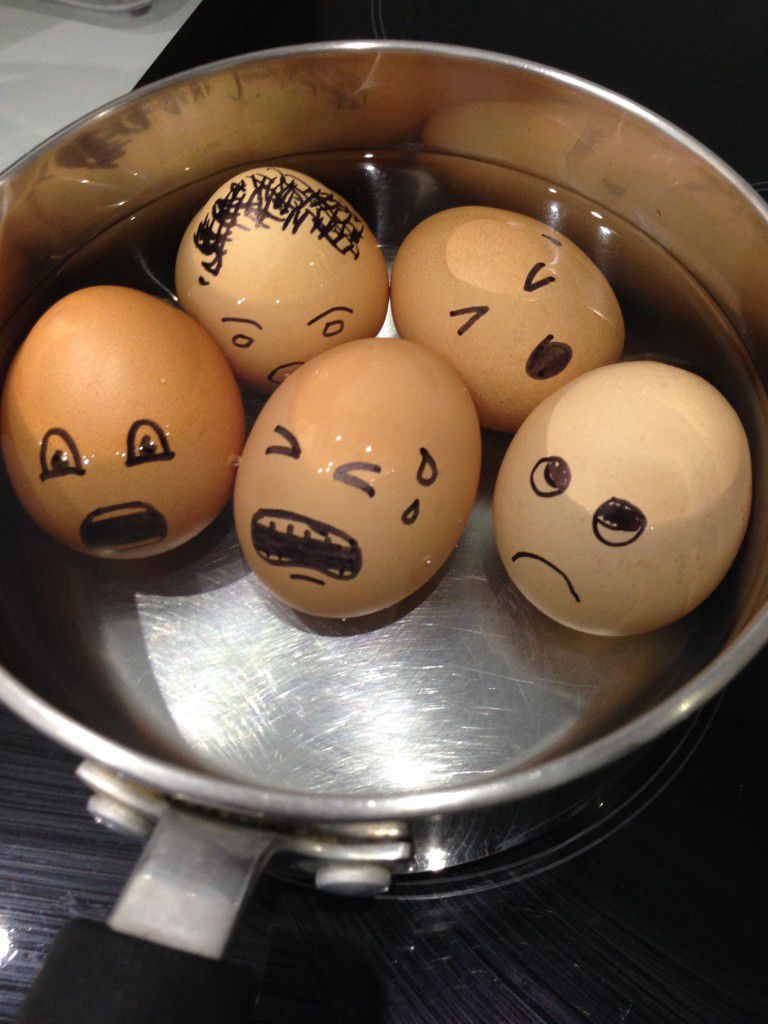EuroTalk Egg-Smashing Championship 2016 – Who Will Win?
It’s Easter, which for some of us means chocolate eggs or hot cross buns, but here at EuroTalk we’re celebrating with another tradition: egg tapping. It’s very simple, so you can do it from home:
1) Boil a load of eggs, one for each participant.
2) Decorate the eggs- This can be done in a number of ways, the most popular of which may be to boil them with onion skins to make a reddish finish. If you’re feeling artistic, press some leaves against the unboiled eggs and secure them with an old stocking, then boil them to leave the impression of the leaf. You can also paint the egg after boiling. Here at EuroTalk, we enjoy personifying our eggs so we put little warrior faces on them (with some of them even going to the effort of putting their war-paint on!)
3) Arrange yourselves into pairs, and in each pair tap first the tops of your eggs together, then the bottoms. If an egg cracks, it loses the round, and you have to eat it. The winner is the one whose egg survives the longest!
The EuroTalk Championships:
Round 1: Alex versus Ioana: After a small amount of cracking on the top of Alex’s egg, Ioana really smashed her advantage home by shattering the bottom of her opponent’s egg: a clear winner.
Round 2: Safia versus Nat: The initial tap only drew a tiny crack from Safia’s egg, but the second tap left the same egg in shreds whilst Nat’s was still uninjured.
The Final: Ioana versus Nat:
Nat’s egg suffered a major injury in the first round, but a strong grip during the second tap left Ioana’s egg struggling in the ring, and Nat’s egg was crowned the winner of this year’s 2016 Egg Smashing Championships!
We celebrated by eating all the egg participants, winners and losers, to prove that no foul-play (concrete fillings etc.) had been perpetrated in the preparing of the eggs.
Tune in next year to see how the eggs perform!
Lost, drowned, in a shirt… how do you like your eggs?
Happy World Egg Day!
English is quite a boring language when it comes to eggs. We boil them, scramble them, poach them, fry them. All very ordinary.
Which is why we were delighted to discover that other languages are more dramatic in their approach to eggs!
Over to Italy:
For Italians, poached eggs are literally ‘eggs in a shirt’ – ‘le uova in camicia’ – possibly because the frilly poached egg white looks like the sleeves of a loose blouse.
Alternatively (but still quite theatrically), you can call them ‘le uova affogate’ (literally ‘drowned eggs’). Poor old eggs!
And now to Germany:
Maybe it’s the same idea of drowning that makes Germans call their poached eggs ‘verlorene Eier’ – ‘lost eggs’. The eggs, like sailors lost at sea, drown quietly in the saucepan.
Or, if it’s a fried egg you’re after, the Germans have a pretty expression for that too: ‘Speigeleier’, literally ‘mirror eggs’. Can anyone tell us why..?
Bullseye!
In Italian, Slovak and Czech (to name but a few), the fried egg is the ‘bullseye egg’- because, of course, it resembles a bullseye (or a porthole, which is the same word): ‘le uova all’occhio di bue’ (Italian), ‘volské oko’ (Slovak), ‘volská oka’ (Czech).
Eyes in a pan?
A similar idea, though slightly more graphic, applies in Bulgarian and Slovenian where the fried eggs (‘яйца на очи’ and ‘jajce na oko’ respectively) translate as ‘eggs eye-style’! So next time you fry an egg, you may choose to remember this vocabulary by imagining a big eyeball staring up at your from the plate… OR you may choose to stick to the safe, if rather boring, English equivalent.
Got any other interesting egg-related vocabulary? Let us know!


